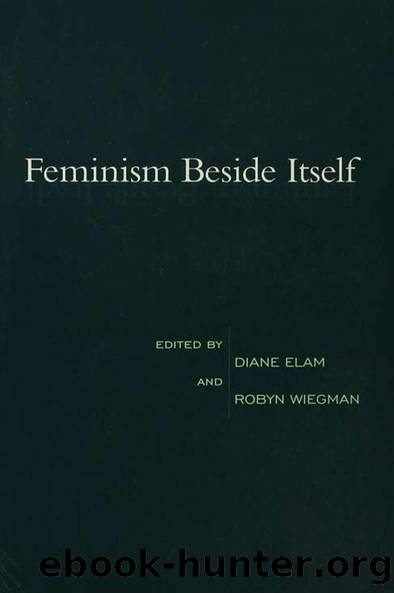Feminism Beside Itself by Diane Elam Diane Elam

Author:Diane Elam, Diane Elam [Diane Elam, Diane Elam]
Language: eng
Format: epub
ISBN: 9780415910415
Barnesnoble:
Publisher: Taylor & Francis
Published: 1995-03-30T00:00:00+00:00
BEGINNING AGAIN: A DIALOGUE
The liar uses the valid designations, the words, to make the unreal appear as real; she says, for example, âI am rich,â when the word âpoorâ would be the correct designation of her situation. She abuses the fixed conventions by arbitrary changes or even by reversals of names. When she does this in a self-serving ways damaging to others, then society will no longer trust her but exclude her. Thereby people do not flee from being deceived so much as from being damaged by deception: what they hate at this stage is basically not the deception but the bad, hostile consequences of certain kinds of deceptions. In a similarly limited way people want the truth: they desire the agreable life preserving consequences of truth, but are indifferent to pure knowledge, which has no consequences; they are even hostile to possibly damaging and destructive truths. And, moreover, what about these conventions of language? Are they really products of knowledge, of the sense of truth? Do the designations and the things coincide? Is language the adequate expression of all realities?
âNietzsche, âOn Truth and Lie in the Extra-Moral Senseâ33
Q: You have asserted several times that the crisis of value which consideration of Stein seems to have provoked in certain feminist critical circles has something to do with the attempt to establish and assess a properâor âpureââfeminist inheritance. Could you explain what, if anything, such an inheritance has to do with your interest in and call for a feminist genealogy? What do you mean by genealogy, and how do you understand it to be a critique of notions of or claims to inheritance?
A: I borrow my particular use of the term âgenealogyâ from Nietzsche and from Foucault, although the critical practices that the two of them associate with genealogy are not entirely foreign to feminismâin fact, one could argue that genealogical thinking is at the root of feminism. Iâll be happy to make such an argument later on, but for now Iâll try to answer your first question.
In particular, I have found provocative and useful Nietzscheâs suggestion that any given assertion of value or values (as, for example those given in the MLA panel) calls for an investigation. For contrary to some very cherished beliefs about values (beliefs that one might even call religious), values are not inherent, self-evident, or transcendental, and each particular expression of or call for particular values (including my own here) may be traced historically, logically, and rhetorically. As Nietzsche describes the task: âthe value of these values must first be called into questionâand for that there is needed a knowledge of the conditions and circumstances in which they grew, under which they evolved and changed (morality as consequence, as symptom, as mask, as tartufferie, as illness, as misunderstanding; but also morality as cause, as remedy, as stimulant, as restraint, as poison)...â34 In effect, Nietzsche argues that a genealogy is a special kind of history, a mode of reading that allows one to reflect critically upon modes
Download
This site does not store any files on its server. We only index and link to content provided by other sites. Please contact the content providers to delete copyright contents if any and email us, we'll remove relevant links or contents immediately.
Collaborating with Parents for Early School Success : The Achieving-Behaving-Caring Program by Stephanie H. McConaughy; Pam Kay; Julie A. Welkowitz; Kim Hewitt; Martha D. Fitzgerald(896)
Entrepreneurship Education and Training: The Issue of Effectiveness by Colette Henry Frances Hill Claire Leitch(664)
Adding Value to Policy Analysis and Advice by Claudia Scott; Karen Baehler(499)
Materializing the Middle Passage by Jane Webster;(496)
Race and American Political Development by unknow(485)
Sociological Perspectives of Health and Illness by Constantinos N. Phellas(476)
American Government and Politics Today by Steffen W. Schmidt Mack C. Shelley Barbara A. Bardes(475)
Human and Global Security : An Exploration of Terms by Peter Stoett(460)
Control Of Oil - Hardback by Kayal(457)
The Disappearance of Rituals: A Topology of the Present by Byung-Chul Han(398)
Advances in Child Development and Behavior, Volume 37 by Patricia J. Bauer(395)
The Catholic Church and European State Formation, AD 1000-1500 by Jørgen Møller(388)
The World According to China by Elizabeth C. Economy(378)
Theories of Counseling and Psychotherapy: A Case Approach by Nancy L. Murdock(370)
Left Is Not Woke by Susan Neiman(366)
Application of classical statistics, logratio transformation and multifractal approaches to delineate geochemical anomalies in the Zarshuran gold district, NW Iran by unknow(362)
Turkey's Relations with the West and the Turkic Republics: The Rise and Fall of the Turkish Model by Idris Bal(352)
Cross-Cultural Child Development for Social Workers by Lena Robinson(347)
Japan's Ainu Minority in Tokyo by Mark K. Watson(330)
